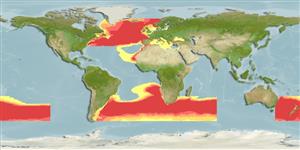Environment: milieu / climate zone / depth range / distribution range
Ecologia
marinhas batipelágico; intervalo de profundidade 40 - 1050 m (Ref. 52180), usually 300 - 700 m (Ref. 52180). Deep-water; 68°N - 55°S, 180°W - 180°E
North Atlantic: Nova Scotia and Grand Banks (Canada) to Massachusetts, USA (Ref. 7251). Also known from the Northeast Atlantic and the Mediterranean Sea. Southeast Atlantic and Indian Ocean: South Africa and Australia (including New South Wales). Southwest Pacific: New Zealand. Southern Ocean. Antitropical.
Tamanho / Peso / Idade
Maturity: Lm ? range ? - ? cm
Max length : 150 cm SL macho/indeterminado; (Ref. 4542); common length : 60.0 cm TL macho/indeterminado; (Ref. 3397)
Descrição suscinta
Chaves de identificação | Morfologia | Morfometria
Espinhos dorsais (total) : 5; Raios dorsais (total) : 37 - 41; Espinhos anais: 3; Raios anais : 20 - 24. Dark brown to black, occasionally almost bluish; median and pelvic fins darker than body; young with 2-4 vertical bars (Ref. 4410). Snout is slightly longer than the eye diameter (Ref. 35388).
An oceanic, epipelagic or mesopelagic species (Ref. 6942). Juveniles occurring in surface waters (Ref. 4542) and associated with pelagic medusas and salps (Ref. 4410), adults found deeper (Ref. 4542). May form small schools. Appears to feed on whatever is available, small fish, squid, large pelagic crustaceans, and other plankton (Ref. 4542).
Ciclo de vida ou comportamento de acasalamento
Maturidade | Reprodução | Desova | Ovos | Fecundidade | Larvas
Haedrich, R.L., 1990. Centrolophidae. p. 1011-1013. In J.C. Quero, J.C. Hureau, C. Karrer, A. Post and L. Saldanha (eds.) Check-list of the fishes of the eastern tropical Atlantic (CLOFETA). JNICT, Lisbon; SEI, Paris; and UNESCO, Paris. Vol. 2. (Ref. 6942)
Status na Lista Vermelha da UICN (Ref. 130435: Version 2024-1)
Ameaça para os humanos
Harmless
Uso pelos humanos
Pescarias: de interesse potencial; peixe esportivo: sim
Ferramentas
Relatórios especiais
Baixar XML
Fontes da internet
Estimates based on models
Preferred temperature (Ref.
123201): 2.7 - 11.9, mean 7 °C (based on 632 cells).
Índice de diversidade filogenética (Ref.
82804): PD
50 = 1.0000 [Uniqueness, from 0.5 = low to 2.0 = high].
Bayesian length-weight: a=0.00661 (0.00334 - 0.01306), b=3.09 (2.91 - 3.27), in cm total length, based on LWR estimates for this species & (Sub)family-body (Ref.
93245).
Nível Trófico (Ref.
69278): 3.9 ±0.38 se; based on food items.
Resiliência (Ref.
120179): Muito baixo(a), tempo mínimo de duplicação da população maior que 14 anos (Preliminary K or Fecundity.).
Fishing Vulnerability (Ref.
59153): Very high vulnerability (90 of 100).
Climate Vulnerability (Ref.
125649): Moderate vulnerability (38 of 100).
Nutrients (Ref.
124155): Calcium = 13.3 [4.9, 29.3] mg/100g; Iron = 0.277 [0.123, 0.772] mg/100g; Protein = 18.7 [16.7, 20.6] %; Omega3 = 0.164 [0.069, 0.380] g/100g; Selenium = 21.1 [7.6, 55.5] μg/100g; VitaminA = 20.5 [2.8, 160.8] μg/100g; Zinc = 0.376 [0.209, 0.737] mg/100g (wet weight);
